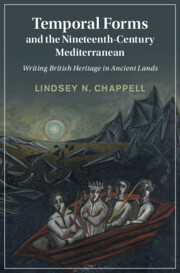Book contents
- Temporal Forms and the Nineteenth-Century Mediterranean
- Cambridge Studies in Nineteenth-Century Literature and Culture
- Temporal Forms and the Nineteenth-Century Mediterranean
- Copyright page
- Contents
- Figures
- Acknowledgments
- Introduction
- Part I “Civis Romanus Sum”
- Part II “We Are All Greeks”
- Chapter 3 Inheritance
- Chapter 4 Irony
- Coda to Part II Whitewashing Hellas
- Part III “Kindred with the Mummy”
- Conclusion
- Notes
- Bibliography
- Index
- Cambridge Studies in Nineteenth-Century Literature and Culture
Chapter 3 - Inheritance
from Part II - “We Are All Greeks”
Published online by Cambridge University Press: 09 November 2024
- Temporal Forms and the Nineteenth-Century Mediterranean
- Cambridge Studies in Nineteenth-Century Literature and Culture
- Temporal Forms and the Nineteenth-Century Mediterranean
- Copyright page
- Contents
- Figures
- Acknowledgments
- Introduction
- Part I “Civis Romanus Sum”
- Part II “We Are All Greeks”
- Chapter 3 Inheritance
- Chapter 4 Irony
- Coda to Part II Whitewashing Hellas
- Part III “Kindred with the Mummy”
- Conclusion
- Notes
- Bibliography
- Index
- Cambridge Studies in Nineteenth-Century Literature and Culture
Summary
Chapter 3 shows how British writers (including Lord Byron, Felicia Hemans, and Percy Shelley) grappled with the question of who owned classical Greek culture in the years following the Napoleonic Wars. With Greece long under rule by the Ottoman Empire, Britain wrote itself as ancient Greece’s culture heir. Inheritance was the temporal form that facilitated this transfer, not only of the succession of culture but also of material, as I show in British arguments surrounding Lord Elgin’s acquisition of marble relics from the Parthenon. I end by considering Greek antiquities in the British Museum and the attendant conflicts about universal cultural heritage they continue to engender.
Keywords
Information
- Type
- Chapter
- Information
- Temporal Forms and the Nineteenth-Century MediterraneanWriting British Heritage in Ancient Lands, pp. 105 - 128Publisher: Cambridge University PressPrint publication year: 2024
